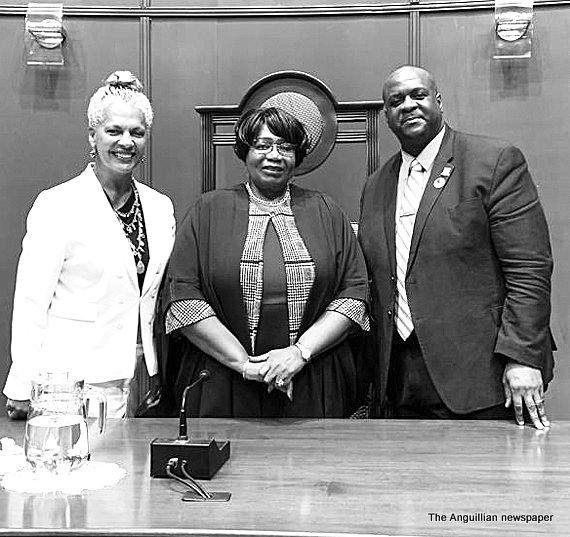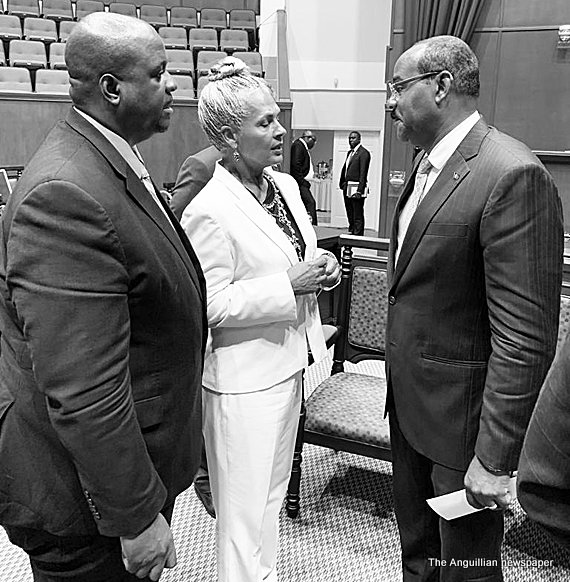
Last week, I was grateful to be invited, in my capacity as Leader of the Opposition in Anguilla, to participate in the 4th sitting of the Organisation of Eastern Caribbean States (OECS) Assembly which was held in the Parliament Building in Antigua and Barbuda. I must commend the OECS for understanding the importance of equality in governance, by providing a seat at the table for Opposition parliamentarians from the various member states. This is critical to participatory democracy – a major pillar upon which our collective parliamentary democracies are built.
The OECS is a very important international and intergovernmental organisation which was established in 1981. The OECS is dedicated to economic harmonisation and integration, protection of human and legal rights, and the encouragement of good governance among independent and non-independent countries in the Eastern Caribbean. Moreover, as a long standing associate member of the OECS, Anguilla is connected to our Eastern Caribbean neighbours through the economic union and also plays an important role in the achievement of the objectives of the OECS which include regional integration, climate resilience, social equity and aligning our foreign policy initiatives to our development needs as Small Island Developing States (SIDS).
This year’s sitting of the OECS Assembly focused heavily on updates from member states affected by Hurricane Irma, including the recovery efforts and the delivery of aid pledges. There were also several discussions on Climate Change Action, De-Risking in the region and the potential loss of Correspondent Banking Relations. Such issues have a direct impact on the quality of life of our people and require further and important dialogue with and between heads of government on these issues. It is within this regional space that important decisions are made, and greater cohesion is achieved, so that we can speak with boldness as one voice to the international community, particularly at a time when the region on a whole is in great need of finances to build climate resiliency due to our extreme vulnerabilities to the negative effects of climate change. This was a critical point of debate and discussion during a motion on “Championing Urgent and Ambitious Climate Change Action in the OECS”.
In light of the serious issues on the agenda of this year’s OECS assembly, I must express to the people of Anguilla my overwhelming disappointment that no one from Anguilla’s current administration attended these proceedings. It is important to note the significance of this absence because, as everyone would recognise, the ability to commit a government’s time, resources and priorities, as well as to participate in specific dialogue with and between other heads of government, lies outside the purview of Opposition Leaders. Thus, it was critically important for the government of Anguilla not only to attend this important event, but to speak to the priority issues raised in this regional forum. If the Premier was otherwise engaged, then the failure to appoint a representative to attend and speak on the government’s behalf can be considered a major oversight. There is no other conclusion that can be drawn, in the absence of any communication to the people by way of explanation, informing us why the custodians (at the government level) of the people’s business were absent from this vitally important regional assembly.

Furthermore, the broader issue of Caribbean Regional Integration must be properly ventilated in the public and political sphere of our country. We should not segregate ourselves from our Caribbean neighbours who face similar developmental challenges and vulnerabilities to external shocks as we do. We are stronger together than we are apart, and we must embrace our full identity as an Eastern Caribbean state.
If we look back at the history of Anguilla, we will see that our long standing co-dependent relationship with St. Martin/St. Maarten is a true testament to Caribbean integration, as we are not only interconnected at the economic level but also at the social level (family ties). There is much speculation and uncertainty as to how this long standing model of integration with St. Martin/St. Maarten will be affected by Brexit. While we should remain committed to ensuring that this relationship with our closest neighbour is protected and maintained in the post-Brexit era, of equal importance is the expansion and strengthening of our regional ties within the OECS. Anguilla must not be left behind within this bold new frontier of regional and international relations and an ever-changing global economy. Our foreign relations must therefore be proactive and creative to effectively mitigate these circumstances. Our government must not turn in on itself and isolate us from regional and worldwide developments.
There are several lessons that Hurricane Irma has taught us – one of which is the effectiveness of collective lobbying within the international community to provide funding for climate resiliency in our respective member states. This is critical to mitigating the negative effects of climate change and to better prepare us for future storms. As such, every opportunity to make representations on these issues on a regional and international scale should not be lightly missed.
This year’s OECS forum also raised other important issues for consideration and discussion. For example, the issue of financial De-Risking and the increasing difficulties in correspondent banking relations. These have serious repercussions for our region, and directly affect Anguilla in terms of the ease of doing business which is a key element of Foreign Direct Investment (FDI) and the growth and development of our business sector. Such issues must be prioritised going forward, and we must find ways, as a collective group, to represent our common interests at the global level. And in the context of Anguilla’s turbulent history in the banking sector, such concerns must be and remain a top concern for this current administration and, by extension, for every Anguillian.
As we continue to face our challenges head on, let us remember that we are not alone in this fight. We have brothers and sisters who face similar challenges and we must work together with them to address those challenges. Being in favour of regional integration does not mean that we sacrifice our own individuality as sovereign nations. On the contrary, regional integration is an opportunity to pool our resources and strengths together – to advocate for our common interests. This is what it truly means to be our brother’s keeper; a value that we can all agree is truly what being an Anguillian is all about.







